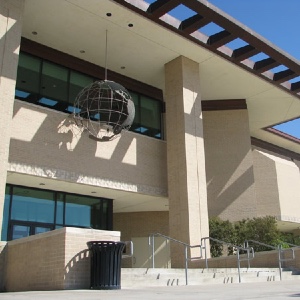TAMIU Counseling Expands Services to Students Dealing with COVID-19 Stress

The ongoing response to the COVID-19 Pandemic has seen Texas A&M International University (TAMIU) expand student counseling services as students return to classes this Fall.
Those expanded services include both in-person and virtual counseling sessions, a 24/7 crisis line, additional training, and a self-help platform, said Rosabel Ramos, associate director of TAMIU’s Student Counseling Services.
“Like the rest of campuses across the nation, the past 18 months have created special demands on counseling services to include focusing on COVID-19-related anxiety and stress affecting students. We quickly adapted to providing teletherapy services for the safety of everyone from the onset of the Pandemic. Most students mentioned having difficulty with the Pandemic at the beginning of the changes. While some students still disclose anxiety or other difficulties due to COVID-19, others seem to have adapted and found safe alternatives to meet their needs,” Ramos noted.
With the start of the Fall semester this week and a return to a full, vibrant campus experience, Ramos said Counseling Services professionals are prepared for students and their preferences for service.
“While we have returned to a face-to-face environment, many students are transitioning back to campus for the first time and want to stay virtual. Individual counseling is the most requested service,” Ramos explained, “Some students have remained with us virtually throughout this experience, and some have decided to continue services on their own.”
Ramos said that virtual delivery of counseling services does take some adjustment.
“Current research shows that face-to-face and virtual counseling are equally effective. That said, it does take some adjustment and we’ve undergone additional training to better manage the technology. While both counseling modes look to client facial cues as indicators, we’re not able to as easily discern important body language virtually. We’re also trained to look at the environment that frames the virtual session for additional indicators,” she noted.
Ramos said that TAMIU has developed other services and tools to help students explore their own situation as they consider the various levels of service optimal for them.
“For example, for general anxiety, we help students explore educational resources through Therapy Assistance Online (TAO). This provides students with access to an online platform of fun and educational videos, interactive exercises, a mindfulness library, practice tools, and progress measures. It empowers users to take charge of their treatment and life through setting goals. Since its launch, we’ve gone from 30 to well over 200+ users. We’ve also developed a popular Self-Care packet on COVID-19 that looks at ways to practice stress management and self-care while navigating COVID-19 concerns. As a staff, we’ve also taken on certification as Mental Health First Aid (MHFA) instructors, which allows us to then certify students and our TAMIU community to become Mental Health First Aiders by attending training. We continue to provide individual, couple, and family counseling services as well as other educational resources such as presentations and information resources. All students first complete a consultation appointment to address their specific need, whether it is related to COVID or not. We also provide access to COVID-19 related topics for viewing on our Facebook page,” she said.
She said a staffed, 24/7 crisis line is one of the most important TAMIU service additions made possible through federal funding.
“This is a truly important addition to our services as it provides immediate response for crises situations including assault, trauma, and suicidal ideation. Students in crisis can call 956.326.2230 and be helped locally,” she explained.
Ramos said she wants all TAMIU students to realize counseling services are available and can truly help them.
“We’ve all been going through some monumental changes throughout the Pandemic. As a currently registered TAMIU student, students have access to short-term counseling services at no cost that can truly help. The service is confidential and information cannot be shared except for an emergency situation. If you are having difficulty, it is always best to schedule a consultation appointment to help you learn your options. If students feel counseling services are not something they want to pursue at the moment, we encourage them to register for TAO which teaches skills to cope with difficulty…also free of charge. A good first step is simply to visit our website at https://www.tamiu.edu/counseling/, she explained.
Ramos said this Fall she is looking forward to Student Counseling’s annual observance of National Mental Health Awareness Week, Oct. 4 – 7.
“Last year, we had to offer everything virtually, but this year we’re looking at face-to-face, hybrid, and virtual offerings to include a wellness fair, guest speakers, an art contest, an awareness walk, and more,” she said.
To find out more about TAMIU Student Counseling Services, visit offices in Student Center 128, email counseling@tamiu.edu, or call 956.326.2230.
Classes for the 2021 Fall Semester at TAMIU began Monday, Aug. 23. Late registration continues through Friday, Aug. 27. For detailed registration information, visit go.tamiu.edu/registration21
For more information, contact the Office of the University Registrar at 956.326.2250, email registrar@tamiu.edu or visit offices in the Senator Judith Zaffirini Student Success Center, suite 121.

